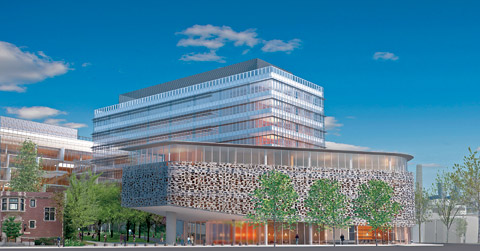
HI, TECH! The stretch of Mass Ave between MIT and Central Square will soon look very different, as construction begins on a 35-acre office park for pharmaceutical giant Novartis, and a block of buildings across the street is knocked down to make room for a new MIT research facility.
|
This is the second article of a two-part series about the development of Central Square.Read the first part here.Any day now, construction crews will demolish the block between 298 and 334 Mass Ave, a stretch of Central Square that includes All Asia, the Thailand Café, and JN Phillips Auto Glass. The building that will replace them: a five-story, roughly 240,000 square-foot MIT research facility. Across the street, on MIT-owned property, pharmaceutical giant Novartis has begun construction on a $600 million, 35-acre steel-and-glass office park — even larger than the one MIT is building in Kendall Square for another Big Pharma company, Pfizer.
A decade from now, the east end of Central Square will look nothing like the west. While homeless people will likely still sleep on stone benches in Carl Barron Plaza and revelers will still pour out of the Cantab Lounge at all hours, at the other end of Mass Ave thousands of tech professionals will go to work in gleaming new structures, shop at the new stores that line their ground floors, and eat at the high-end restaurants that are already springing up.
"MIT dominates Central Square in a way we never realized before," says Cambridge city councilor and former mayor Kenneth Reeves.
In fact, MIT owns roughly a third of it. Like Harvard to the west, the university holds tremendous power on the realm just beyond its campus. And as MIT and its affiliates stretch out into a socioeconomically diverse neighborhood filled with mom-and-pop retailers, social-service providers, restaurants, and nightlife, Cambridge city officials are fighting to keep the tech sector in balance with the rest of Central Square. Their challenge: to persuade MIT and other local property owners to keep the larger community in mind, while facing the temptation of tech-development projects and fistfuls of cash. In many cases, this means accepting the less-profitable option.
But while MIT and its corporate partners have the money to finance ambitious new development, some of Central Square's stakeholders do not. Private individuals — some with five or more buildings, some with only one — own the rest of the neighborhood. City officials need their cooperation, too.
"If they just act out of their own self-interest, then you end up with something really unattractive," says Bob Simha, who served as director of MIT's planning office for almost 40 years. "[Good development] doesn't happen by accident. It happens by the mutual intent of the parties — the city, the institutions, the private sector — to ensure that they all contribute to making these places attractive and interesting."
The new stores, restaurants, bars, and gyms popping up around Central Square are also integral to its potential future as an innovation center. When tech execs run into each other on the treadmill or at the tapas bar, they forge social ties that generate more innovation. It even has a special name: bumping and mingling. "You need to be living in an environment where people meet," says Reeves. "This 'bump and mingle factor' is a part of the secret sauce."
Simha cites Pfizer's inclusion of Flour Bakery and Central Bottle on the ground floor of its Mass Ave offices as a successful mixed-use initiative. "That space sat empty for several years, but as soon as they moved in, the street began to jump," he says. "That's the recipe for a safe street."
But the Necco factory that Novartis converted into its first Cambridge headquarters — part of an MIT mixed-use development called University Park— doesn't encourage him. "There's a steel gate across the opening," he says. "Why is there a gate? Is there anything in this courtyard that will be accessible to the public?
"One of the questions that comes up [when planning a new development] is: will it be part of the community, or will it be insular?" Simha asks. "Will it be the kind of thing that the public is invited in? Will it have a gate? Those are the questions that are being raised and need to be answered properly. Otherwise, you'll have a controlled space."